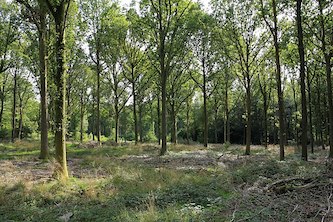A group of British experts has warned that the UK’s forests are at risk of facing a “catastrophic ecosystem collapse” within the next 50 years. This collapse, caused by factors such as wind, fire, pests, and disease, could lead to the sudden fading and death of trees, resulting in silent and lifeless forests. However, the experts believe that if action is taken promptly, this catastrophe can be averted.
The UK, being one of the least forested countries in Europe, is facing various challenges such as climate change, biodiversity loss, invasive species, and damage from deer and grey squirrels. Additionally, there is a shortage of skills in the forestry sector, which poses a threat to achieving government tree planting targets. To address these issues, the experts suggest planting forests with a variety of species that are more resilient to environmental pressures and better for wildlife.
The study, conducted by Forestry England and the University of Cambridge, also identified other emerging issues such as competition with human society for water, new pests and pathogens, and extreme weather affecting forest management. These findings were published in the journal, Forestry, marking the first “horizon-scanning” exercise for UK forests.
Dr. Eleanor Tew of Forestry England and Cambridge University emphasized the importance of taking action to make forests more resilient for future generations. She stated that while the situation is concerning, there is still time to make a positive impact and safeguard the joy and benefits that forests provide to humanity.
In conclusion, the experts urge immediate action to address the challenges facing the UK’s forests. By implementing solutions such as planting diverse forests and addressing emerging issues, it is possible to prevent the potential collapse of the nation’s woodlands and ensure their continued thriving for future generations.
Original news source: UK forests face ‘catastrophic ecosystem collapse’ (BBC)
Listen
Slow
Normal
Fast
Group or Classroom Activities
Warm-up Activities:
– News Summary
Instructions: Students will be given a few minutes to read the article. Then, they will work individually to summarize the article in three sentences, capturing the main points. After writing their summaries, they will share them with a partner and discuss the similarities and differences in their summaries.
– Opinion Spectrum
Instructions: Write a series of statements related to the article’s content on the board (e.g., “The UK government should prioritize forest conservation over other land uses,” “Biodiversity loss is a more pressing issue than climate change,” etc.). Students will place themselves along an imaginary line in the classroom according to their level of agreement or disagreement with each statement. This will prompt discussion and encourage students to use language to express opinions and justify their positions.
– Keyword Taboo
Instructions: Prepare a list of keywords from the article (e.g., ecosystem collapse, biodiversity, invasive species, forestry, resilience). Divide students into two teams. One student from Team A must describe the keyword to their teammates without using the word itself or any other words from a list of related words you provide. If the team guesses the keyword correctly within a set time, they score a point. Then it’s Team B’s turn, and so on.
– Future Predictions
Instructions: Ask students to imagine they are environmental consultants 50 years into the future. Have them write a short report or presentation based on two scenarios: one where the catastrophic ecosystem collapse happened, and one where it was averted through the actions suggested by the experts. They should use language for prediction and speculation, and then present their reports to the class.
– Synonym Challenge
Instructions: Write down several words from the article on slips of paper (e.g., catastrophic, resilient, diversity, pathogens). Students work in pairs or small groups. One student picks a slip and must describe the word using synonyms or by giving a definition without saying the actual word. Their partner(s) must guess the word. This activity helps to expand vocabulary and enables students to practice paraphrasing.
Comprehension Questions:
1. What catastrophic event are UK forests at risk of facing within the next 50 years according to British experts?
2. What are the factors contributing to the potential collapse of UK forests?
3. Why is the UK particularly vulnerable to forest collapse compared to other European countries?
4. What challenges are currently facing the UK’s forests aside from the threat of ecosystem collapse?
5. What do the experts suggest as a solution to make forests more resilient?
6. Who conducted the study warning about the UK’s forest risks, and where was the study published?
7. What does Dr. Eleanor Tew say about the potential to mitigate the risks to forests?
8. What are some of the emerging issues identified in the study that affect forest management?
Go to answers ⇩
Listen and Fill in the Gaps:
A group of British (1)______ has warned that the UK’s forests are at risk of facing a “catastrophic ecosystem collapse” within the next 50 years. This collapse, caused by factors such as wind, fire, pests, and disease, could lead to the sudden fading and death of trees, resulting in silent and lifeless forests. However, the experts (2)______ that if action is taken promptly, this catastrophe can be averted.
The UK, being one of the (3)______ forested (4)______ in Europe, is facing various challenges such as climate change, biodiversity loss, invasive species, and damage from deer and grey squirrels. Additionally, there is a shortage of skills in the forestry sector, which poses a (5)______ to achieving government tree (6)______ targets. To address these issues, the experts suggest planting forests with a (7)______ of species that are more (8)______ to environmental pressures and better for wildlife.
The study, conducted by Forestry England and the University of Cambridge, also identified (9)______ emerging (10)______ such as competition with human society for water, new pests and pathogens, and extreme weather affecting forest management. These findings were published in the journal, Forestry, (11)______ the first “horizon-scanning” (12)______ for UK forests.
Dr. Eleanor Tew of Forestry England and Cambridge University emphasized the importance of taking action to make forests more resilient for future generations. She stated that while the situation is concerning, there is still time to make a positive impact and safeguard the joy and benefits that forests provide to (13)______.
In conclusion, the experts urge immediate action to (14)______ the challenges facing the UK’s forests. By implementing solutions such as planting diverse forests and addressing emerging issues, it is possible to prevent the potential collapse of the nation’s woodlands and ensure their (15)______ thriving for future (16)______.
Go to answers ⇩
Discussion Questions:
Students can ask a partner these questions, or discuss them as a group.
1. What is your definition of a “catastrophic ecosystem collapse” and have you ever witnessed any signs of it in your local environment?
2. How would you feel if the forests near where you live started to die off rapidly?
3. Do you like the idea of planting a variety of tree species to increase forest resilience? Why or why not?
4. Do you think your country is doing enough to combat threats to its forests, such as pests and diseases?
5. What is the importance of biodiversity in your opinion, and how does it contribute to the health of forests?
6. Have you ever seen the effects of invasive species on natural habitats in your area? Can you describe the impact?
7. How do you believe climate change is affecting the forests and wildlife in your region?
8. What role do you think forestry management should play in the conservation of forests?
9. Do you think the shortage of skills in the forestry sector is a problem in your country? Why or why not?
10. How would you propose to balance the need for water between human society and forest ecosystems?
11. Do you think extreme weather events are becoming more of a challenge for forest management? Can you provide examples?
12. What actions do you believe individuals can take to help protect and preserve forests?
13. How do you think the loss of forests would affect future generations?
14. Do you think there is enough awareness about the potential collapse of forests among the general public in your country?
15. Can you think of any successful forest conservation projects or initiatives that have inspired you? What made them effective?
Individual Activities
Vocabulary Meanings:
Match each word to its meaning.
Words:
1. collapse
2. ecosystem
3. pests
4. resilient
5. biodiversity
6. pathogens
7. horizon-scanning
8. safeguard
Meanings:
(a) The variety of species in a particular habitat
(b) Identifying and addressing future issues
(c) The sudden fading and death of trees
(d) Protect and ensure the continuation of something
(e) Organisms that cause disease
(f) Factors such as wind, fire, and disease
(g) The ability to withstand environmental pressures
(h) The study of potential future challenges
Go to answers ⇩
Multiple Choice Questions:
1. What is one of the factors that could lead to the collapse of the UK’s forests?
(a) Snow
(b) Sunshine
(c) Rain
(d) Wind
2. What is one of the challenges facing the UK’s forests?
(a) Lack of sunlight
(b) Overpopulation of birds
(c) Invasive species
(d) Excessive rainfall
3. What is one of the suggested solutions to address the challenges facing the UK’s forests?
(a) Removing all trees from the forests
(b) Building more houses in the forests
(c) Introducing more pests and pathogens to the forests
(d) Planting forests with a variety of species
4. What was the first “horizon-scanning” exercise for UK forests conducted by?
(a) Forestry Scotland and the University of Oxford
(b) Forestry England and the University of Cambridge
(c) Forestry Wales and the University of Manchester
(d) Forestry Northern Ireland and the University of Edinburgh
5. Who emphasized the importance of taking action to make forests more resilient for future generations?
(a) Dr. Eleanor Tew
(b) Dr. John Smith
(c) Dr. Emily Jones
(d) Dr. Michael Brown
6. What is one of the emerging issues identified in the study?
(a) Competition with animals for food
(b) Competition with insects for sunlight
(c) Competition with human society for water
(d) Competition with birds for nesting sites
7. What did the experts urge for immediate action to address the challenges facing the UK’s forests?
(a) Implementing solutions such as planting diverse forests
(b) Ignoring the issues and hoping for the best
(c) Cutting down all the trees in the forests
(d) Building more roads through the forests
8. What did the study warn could happen to the UK’s forests within the next 50 years?
(a) Rapid growth of forests
(b) Catastrophic ecosystem collapse
(c) Increase in forest biodiversity
(d) Decrease in forest pests and pathogens
Go to answers ⇩
True or False Questions:
1. The experts suggest planting forests with a variety of species that are more resilient to environmental pressures and better for wildlife.
2. The collapse of the UK’s forests could be caused by factors such as wind, fire, pests, and disease.
3. The forestry sector in the UK is facing a shortage of skills, which poses a threat to achieving government tree planting targets.
4. The study was conducted by Forestry Scotland and the University of Oxford and was published in the journal, Gardening.
5. A group of British experts has warned that the UK’s forests are at risk of facing a “catastrophic ecosystem collapse” within the next 50 years.
6. Delayed action is encouraged to address the opportunities facing the UK’s forests in order to encourage their potential collapse.
7. Dr. Eleanor Tew of Forestry Scotland and Oxford University emphasized the unimportance of taking action to make forests more resilient for future generations.
8. The UK is one of the most forested countries in Europe.
Go to answers ⇩
Write a Summary:
Write a summary of this news article in two sentences.
Check your writing now with the best free AI for English writing!
Writing Questions:
Answer the following questions. Write as much as you can for each answer.
Check your answers with our free English writing assistant!
1. What are the main factors contributing to the potential “catastrophic ecosystem collapse” of UK forests as mentioned in the article?
2. What specific challenges are UK forests currently facing that exacerbate the risk of collapse?
3. How does the UK compare to other European countries in terms of forest coverage, and why is this significant?
4. What strategies do the British experts recommend to prevent the collapse of UK forests?
5. What role does the study by Forestry England and the University of Cambridge play in addressing the issues faced by UK forests?
Answers
Comprehension Question Answers:
1. What catastrophic event are UK forests at risk of facing within the next 50 years according to British experts?
UK forests are at risk of facing a “catastrophic ecosystem collapse” within the next 50 years.
2. What are the factors contributing to the potential collapse of UK forests?
The factors contributing to the potential collapse include wind, fire, pests, disease, climate change, biodiversity loss, invasive species, and damage from deer and grey squirrels.
3. Why is the UK particularly vulnerable to forest collapse compared to other European countries?
The UK is particularly vulnerable because it is one of the least forested countries in Europe.
4. What challenges are currently facing the UK’s forests aside from the threat of ecosystem collapse?
Challenges include climate change, biodiversity loss, invasive species, damage from deer and grey squirrels, and a shortage of skills in the forestry sector.
5. What do the experts suggest as a solution to make forests more resilient?
Experts suggest planting forests with a variety of species that are more resilient to environmental pressures and better for wildlife.
6. Who conducted the study warning about the UK’s forest risks, and where was the study published?
The study was conducted by Forestry England and the University of Cambridge and published in the journal, Forestry.
7. What does Dr. Eleanor Tew say about the potential to mitigate the risks to forests?
Dr. Eleanor Tew says that while the situation is concerning, there is still time to take action to make forests more resilient for future generations and to safeguard the benefits that forests provide.
8. What are some of the emerging issues identified in the study that affect forest management?
Emerging issues include competition with human society for water, new pests and pathogens, and extreme weather affecting forest management.
Go back to questions ⇧
Listen and Fill in the Gaps Answers:
(1) experts
(2) believe
(3) least
(4) countries
(5) threat
(6) planting
(7) variety
(8) resilient
(9) other
(10) issues
(11) marking
(12) exercise
(13) humanity
(14) address
(15) continued
(16) generations
Go back to questions ⇧
Vocabulary Meanings Answers:
1. collapse
Answer: (c) The sudden fading and death of trees
2. ecosystem
Answer: (a) The variety of species in a particular habitat
3. pests
Answer: (f) Factors such as wind, fire, and disease
4. resilient
Answer: (g) The ability to withstand environmental pressures
5. biodiversity
Answer: (b) Identifying and addressing future issues
6. pathogens
Answer: (e) Organisms that cause disease
7. horizon-scanning
Answer: (h) The study of potential future challenges
8. safeguard
Answer: (d) Protect and ensure the continuation of something
Go back to questions ⇧
Multiple Choice Answers:
1. What is one of the factors that could lead to the collapse of the UK’s forests?
Answer: (d) Wind
2. What is one of the challenges facing the UK’s forests?
Answer: (c) Invasive species
3. What is one of the suggested solutions to address the challenges facing the UK’s forests?
Answer: (d) Planting forests with a variety of species
4. What was the first “horizon-scanning” exercise for UK forests conducted by?
Answer: (b) Forestry England and the University of Cambridge
5. Who emphasized the importance of taking action to make forests more resilient for future generations?
Answer: (a) Dr. Eleanor Tew
6. What is one of the emerging issues identified in the study?
Answer: (c) Competition with human society for water
7. What did the experts urge for immediate action to address the challenges facing the UK’s forests?
Answer: (a) Implementing solutions such as planting diverse forests
8. What did the study warn could happen to the UK’s forests within the next 50 years?
Answer: (b) Catastrophic ecosystem collapse
Go back to questions ⇧
True or False Answers:
1. The experts suggest planting forests with a variety of species that are more resilient to environmental pressures and better for wildlife. (Answer: True)
2. The collapse of the UK’s forests could be caused by factors such as wind, fire, pests, and disease. (Answer: True)
3. The forestry sector in the UK is facing a shortage of skills, which poses a threat to achieving government tree planting targets. (Answer: True)
4. The study was conducted by Forestry Scotland and the University of Oxford and was published in the journal, Gardening. (Answer: False)
5. A group of British experts has warned that the UK’s forests are at risk of facing a “catastrophic ecosystem collapse” within the next 50 years. (Answer: True)
6. Delayed action is encouraged to address the opportunities facing the UK’s forests in order to encourage their potential collapse. (Answer: False)
7. Dr. Eleanor Tew of Forestry Scotland and Oxford University emphasized the unimportance of taking action to make forests more resilient for future generations. (Answer: False)
8. The UK is one of the most forested countries in Europe. (Answer: False)
Go back to questions ⇧















